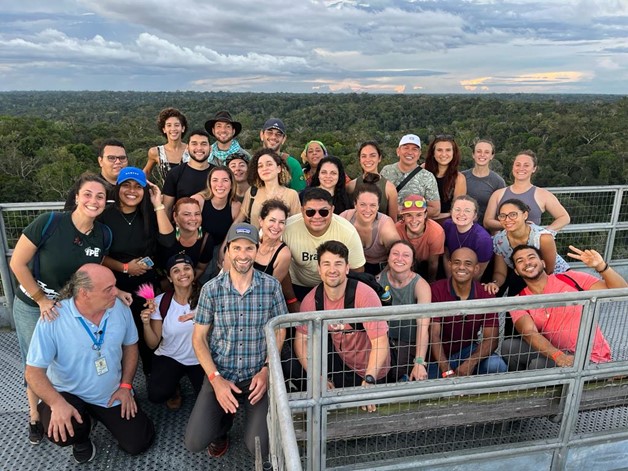We know that solving complex socio-environmental sustainability challenges requires an interdisciplinary and systems-thinking approach that accounts for the perspectives of multiple stakeholders. We also know that Brazil’s Amazon and Atlantic Forest biomes are of global significance—they sequester and store carbon, which mitigates climate change; they harbor more biodiversity than any other terrestrial ecosystem; and they support the livelihoods of millions of Indigenous and traditional forest-dependent people, many of whom live in poverty yet are also critical actors in forest conservation.
In May 2023, Colleen Scanlan Lyons, GCF Task Force Project Director at the University of Colorado Boulder, led twenty-four graduate students from the United States and Brazil to experience these lessons first-hand through a field course in Brazil’s Amazon and Atlantic Forests called “Conservation and Sustainable Development in Brazil’s Tropical Forests.” Over a two-week period that involved (literally) planes, buses, and boats, professional Masters students from the University of Colorado Boulder’s Masters of the Environment Program (MENV) joined with graduate Masters and PhD students from the State University of Amazonas (UEA) in Manaus, Amazonas and the University of Santa Cruz (UESC) in Itabuna, Bahia to travel between the Amazon and Atlantic Forests learning about conservation and sustainable development challenges from the people who live and work in these places—from high level governmental officials to local-level community leaders.
The students grappled with compelling contemporary questions relevant to conservation and development in some of the world’s most famous (and endangered) tropical forests:
- How might a vision of a forest-based bioeconomy be achieved?
- Is it possible to navigate a pathway that achieves both conservation and sustainable development goals?
- What governance mechanisms (e.g., policies, programs) are needed to do so?
- What are the roles of different stakeholders?
- What can be learned across different regions, namely the Amazon and Atlantic Forests, to share lessons learned on integrated conservation and development?
- What opportunities are there for domestic and international collaborative partnerships to contribute to this vision?
- Can sustainable, forest-based bioeconomy strategies conserve important ecosystems while promoting well-being and prosperity among rural populations through strategies such as the commercialization of non-timber forest products, agroforestry, ecotourism, and carbon markets?
To address such questions, the course focused on forests as complex socio-environmental systems, interdisciplinary approaches that use strategies and techniques from different fields of expertise and understanding the opportunities and challenges of multi-stakeholder problem-solving as they struggled with—and thought deeply about how to best address and balance complex challenges such as deforestation, fires, infrastructure development, biodiversity conservation, and poverty eradication. Students lived and worked together. Most of all, they emerged changed and ready to lead in today’s complex conservation and development landscape.
Learn more on the LinkedIn Page, which features students’ projects and works to build a professional network of social-environmental leaders.
Many thanks to the Ecological Research Institute (IPE) team which provided key logistical and content support, and to the United States Agency for International Development (USAID) Brazil office which provided important support for Brazilian graduate student participation in this course.

